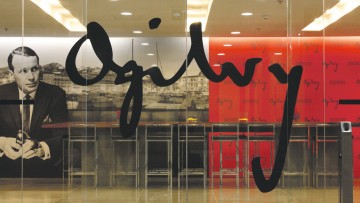As he restlessly travels to the United States and on to Asia, and sometimes Africa, keeping in touch with his £20-billion revenue empire with two BlackBerrys and an iPhone 6, the stream of messages is so constant that staff wonder when Sir Martin Sorrell sleeps.
“I have always wanted to do things on scale, and also I wanted to start something and run it. Some people are good at starting and not running. And others at running not starting,” he says without the need for further explanation.
If there is a strong culture at the company, which 30 years ago was a small manufacturer of wire supermarket baskets, then it flows directly from the person of the company’s tireless chief executive.
As he passes his 70th birthday, there is no sense of slowing down, or of a less focused or less personal engagement. In fact, those who know him best, including his second wife Cristiana Falcone, insist that, if anything, he is speeding up – doing more not less.
“When you start a business from scratch, it’s very personal. It’s like giving birth in a way. The Bill Shankly quote, that football is not a matter of life and death it’s more important than that, applies to WPP and me,” he says.
Equally noticeable, the WPP chief executive has a keen sense of his own worth and achievements, which is reflected, controversially, in his own incentive packages.
Sir Martin bristles at the recent headlines that this year’s £36-million “bonus” will take his pay above £40 million, though regardless of definition, he is almost certainly the highest rewarded chief executive in the FTSE 100 at the moment.
“It’s not even pay. It’s not even remuneration. If you look at this latest award, under the company’s executive incentive scheme, half of it goes in tax and the other half I don’t ‘pocket’ as the newspapers describe it. It stays in the company,” the WPP boss insists.
Over the five years of the scheme, the FTSE 100 companies rose by 21.3 per cent while WPP shares were up by 120.7 per cent.
“Apart from the sad divorce I went through, when I had to sell some shares to settle, I have only sold shares when I have had to for that reason or to pay the tax,” says Sir Martin who emphasises that he has always taken the risk of investing his own money in WPP.
A total of 17 executives, including Sir Martin, have received stock currently worth a total of £70 million under the incentive scheme, the equivalent of 0.78 per cent of the rise in market capitalisation during the qualifying period.
Over the five years of the scheme, the FTSE 100 companies rose by 21.3 per cent while WPP shares were up by 120.7 per cent.
Although Sir Martin’s personal attachment to WPP and the wealth that comes his way as a result can scarcely be in doubt, he can’t be everywhere at once. How does he create a sense of involvement, a culture, in an industry where creativity is vital, across a business that employs 180,000 people, including associated companies in around 3,000 offices in 111 countries?
The answer, of course, is – with difficulty. All such matters are much easier, Sir Martin believes, in “unibrand” companies, such as bankers Goldman Sachs or consultants McKinsey.
“Because we started with nothing, we acquired great brands, having paid significant amounts for them. We do not want to destroy them and we got them by acquisition which is far more difficult,” he concedes.
Life would have been far too short to build such a company by organic growth.
“We have retained our brands and the primary glue; the primary affiliations are about 16 verticals in the group. The reason why people get up in the morning is primarily because they work at ‘vertical’, such as J. Walter Thompson, or Ogilvy or Grey, Young & Rubicam, Mindshare or Mediacom,” Sir Martin explains.

Ogilvy & Mather Paris office
Does that mean either a weak WPP culture or more probably a supervisory culture? After all Sir Martin is notorious for requiring not just quarterly, monthly or even weekly returns, but daily returns from around the world from his subsidiaries.
“I’d hate it [WPP] to be seen as big brother. What we are trying to do is nurture and develop, and we pick out areas of human resources – finding, incentivising and keeping the best people,” he says.
City analyst Lorna Tilbian has put it slightly differently and described the WPP chief executive as “the ringmaster, standing in the middle, getting them to jump through hoops of fire”.
After a pause, Sir Martin notes: “Ringmasters crack whips I think.” The sort of ringmaster he has in mind is the recent putting together, with the help of his Middle East director Roy Haddad, of “a pitch” at a large conference in Egypt. It involved the JWT ad agency and Hill+Knowlton Strategies, the WPP public relations and public policy consultancy.
Sir Martin had noticed that, despite political difficulties, Egypt’s 90-million strong population could propel economic growth.
Clearly part of the attraction of working for WPP is being part of the world’s largest advertising and marketing services company, and being given interesting things to do.
In addition to autonomous life in “the verticals” – the large WPP companies – there is an increasing emphasis on what Sir Martin calls, less than elegantly, “the horizontalities”.

JWT Bogotá headquarters interior design
Clients want to have access to the best people wherever they work. There are now 46 client leaders putting together cross-group teams to serve the top third of clients. They account for £7 billion to £8 billion of the group’s total revenue and 35,000 to 40,000 people work on those accounts. In fact, Sir Martin says 60 per cent of the £20-billion annual WPP revenue goes on people.
“We are a professional services business, and talent and human resources are critical, and we try and incentivise people inside the business in the most competitive and best way possible,” he explains.
In 2013, the last year when figures are available, more than 50,000 employees received share awards and the company invested £64.4 million in training and welfare.
There is also a so-called X Factor programme to mentor and encourage the development of women, who make up 47 per cent of senior managers
For the last 20 years, there has been an annual WPP fellowship programme for graduates and MBAs which provides three one-year rotations throughout the WPP group.
There is also a so-called X Factor programme to mentor and encourage the development of women, who make up 47 per cent of senior managers.
Naturally Sir Martin has firm opinions on the issues of the day. The world economy is “sluggish with too much focus on cost – but manageable”. He doesn’t much like Labour’s “bashing of business”, but is equally concerned about the Conservatives commitment to an EU referendum. “It creates uncertainty and that is not good,” he says.
For WPP and the City, the big question is what happens after Sir Martin – how will the very personal and high-octane culture survive?
“A business that’s founded from scratch – whoever takes over here at whatever time, is probably going to run it differently and probably much better. But they will run it differently, there is no getting away from that,” concludes Sir Martin who, of course, has absolutely no plans to retire anytime soon.



